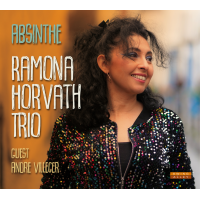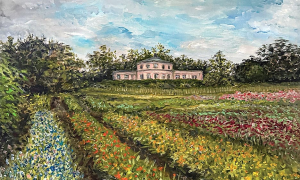
It's a music that celebrates freedom of expression, freedom of choice. That's why we love it. It wants us to love being ourselves and to revel in the majesty of life.
The arrival in April 29, 1999 marked the centennial of the birth of Edward Kennedy (Duke) Ellington, America's most prolific composer of the 20th century in both number of pieces (almost 2,000) and variety of forms. Duke's artistic development and sustained achievement were among the most spectacular in the history of music. His was a distinctly democratic vision of music in the service of the whole band's sound and, more than any other composer, he codified the sound of America in the 20th century.
Duke Ellington's genius manifested itself in his musicianship, his composition and his leadership. He taught himself how to use his ensemble and its individual members as a palette to paint tonal pictures. By 1930 he had already established an international following with several major recordings. Few other artists of the last 100 years have been more successful at capturing humanity's triumphs and tribulations in their work than this composer, band leader and pianist, who died at age 75 in 1974. Now, as musicians, music lovers and musical organizations around the world embark on a yearlong commemoration of Duke's legacy, it is fitting that we reflect on the characteristics that distinguish his artistry.
The roots of Duke's music run deep in American society. His compositions are a synthesis of elemental forms of American music, including field hollers, Shaker hymns, fiddlers' reels, minstrel songs, ragtime, Tin Pan Alley and, most important, the blues. He recognized that the blues was both a form and a feeling. He understood the blues was a mode through which you communicate, like a telephone wire.
He also recognized that the blues attitude can accommodate many ways of hearing life, from the tragic to the triumphant.
Duke peeped W. C. Handy, the first published composer of the blues, and saw how he had come to terms with the contradictory nature of the music, despite having been reared in a high-minded, churchgoing family. (That's right: Some people may sit in the first pew at church, be the most demonstrative voices in the Amen chorus but love the most secular and low-down music and still be God's children.) Duke grasped how a most devout gospel singer like Mahalia Jackson could be influenced by the bawdy and profane blues singing of Bessie Smith. He saw how Louis Armstrong taught others to improvise with a blues feeling and how Armstrong took the blues sound and applied it to harmonic progressions from the classical tradition of Europe, making it possible to play the most non-American material with soul and feeling.
Ellington appropriated the moans, hollers, laughs and cries of the blues to form a harmonic concept that was completely original and homegrown. This system of harmony sometimes played the chromatic and semitone dissonances of the blues against the consonant triadic inversions of gospel music. His chord voicings were famous for swooping, scrunching and soaring.
Duke also recognized the possibilities for development in New Orleans jazz, its polyphony, call and response, riffs, breaks, grooves and improvisational attitudes. Such insight was a great achievement, because New Orleans music during Duke's youth was still a novelty. To many listeners and musicians, it sounded like noise. Even to some who liked it, it seemed indecipherable. When Duke heard this music, he didn't just hear an eccentric sound. He heard all the fundamental musical elements being reinterpreted; for him, this was the first music that had the ease and spontaneity of conversation. Since Duke was one of the world's great conversationalists (with a Ph.D. in late-night conversation), he realized that this music could form the basis of his art.
Given his background, the choices he made to shape his esthetic sensibility were remarkable. Born on April 29, 1899, in Washington to a loving and musical middle-class family, he was playing piano by the time he was 8 years old. An athletic boy who was interested in baseball, football and track, Duke was also a talented painter. He received a scholarship to the Pratt Institute in Brooklyn after high school. But he decided to dedicate his life to music when he began to win acclaim playing piano in dance bands at parties and clubs around town. Early in his career, Duke was inspired by the Harlem stride pianists Luckey Roberts, James P. Johnson and Willie (The Lion) Smith, and in 1922 he moved to New York City with some of his musical homeboys. They created a cooperative band called the Washing-tonians, and their speciality was sweet society dance-band music.
Their first steady gig in New York was at the Kentucky Club. By 1927, Duke's band was transformed. Expanded from 5 to 10 musicians, it had been renamed the Duke Ellington Orchestra. The hot gumbo of New Orleans jazz had replaced tea and crumpets. His ensemble began an extended engagement at the popular Cotton Club in Harlem -- off limits to blacks folks up there in “jungle Harlem." There Duke worked out what became the hallmarks of the Ellington sound: talking brass instruments, wailing clarinets, ritualistic drumbeats, sensual balladry and precision orchestration.
Duke also knew -- and understood -- people of all classes, and tried to reach them on many levels. He coined the term total jazz, and though I have never seen or heard his explanation of it, I think he meant jazz that appeals to all stratums of people, just as Shakespeare's plays appealed to all people. At the old Globe Theater, people on the lowest level, not necessarily of class, mainly enjoyed the nasty jokes and putdowns. At the same time, others in the audience relished some of the greatest poetry since the Bible. All of Western history was Shakespeare's province. Through his poetic powers, he made Greek and Roman mythology compelling to Elizabethan audiences. He covered a lot of ground. So did Duke. Duke even made Shakespeare compelling to jazz fans when he recorded “Such Sweet Thunder" (1957), a suite inspired by Shakespearean themes and commissioned by the Shakespeare Festival of Stratford, Ontario. Duke once responded to a question about how he related to his people, saying “the people are my people."
Duke's artistic mantra was integrate, integrate, integrate. He blended diverse cultural and musical ideas because he understood not only what the country was, but also what it could become.



























